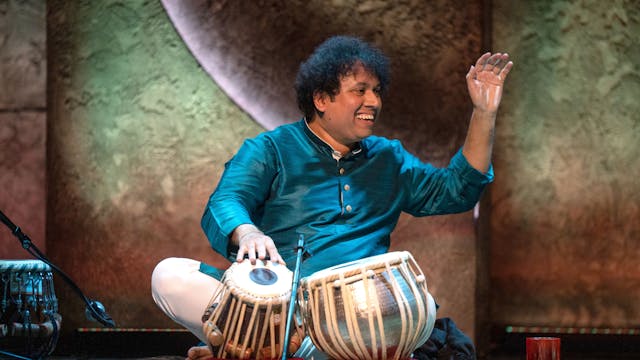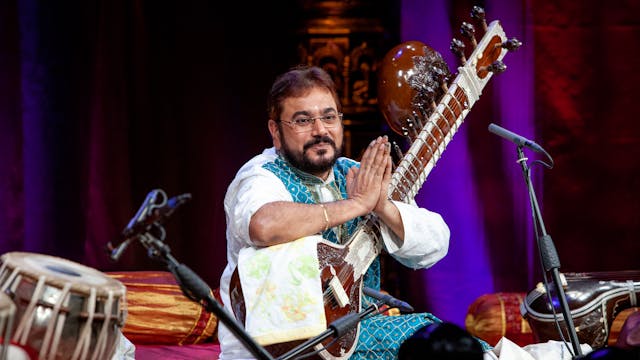Pandit Suresh Talkwalker | Ensemble
Indian Music Appreciation Course
•
1h 37m
Recorded at Darbar Festival 2011, on 23rd April, at King's Place, London.
Musicians:
- Pandit Suresh Talwalkar (tabla)
- Savani Talwalkar (tabla)
- Omkar Dalvi (pakhawaj)
- Chinmay Kolhatkar (harmonium)
- Sameehan Kashalkar (khayal)
- Debipriya Das (tanpura)
Raga Tilang in jhaptal; Thaat: Khamaj; Samay: 21:00 - 00:00 Night
Raag Sohini in teental; Thaat: Marwa; Samay: 03:00 - 06:00 Early Morning
If you have ever attended a tabla solo concert or seen a percussion ensemble perform, it is time you dropped your existing notions. Pandit Suresh Talwalkar’s unmatched presentation of the tabla and its vast capabilities as a musical instrument will cause a paradigm shift in your perception. We are excited to bring to you this full video from Darbar 2011 as the Director’s Cut concert.
Pandit Talwalkar’s ensemble consists of his daughter Savani Talwalkar(tabla), Omkar Dalvi (pakhawaj), Chinmay Kolhatkar (harmonium) and Sameehan Kashalkar (khayal). He insists it is possible to interpret lyrics and melody on the tabla. Pandit Talwalkar takes his audiences on a journey with hair-raising suspense of an Alfred Hitchcock thriller and an unexpected, nail-biting finish like the Ashes 2019 test series (England vs Australia), where England brought the match to a historical draw.
Unlike a conventional tabla solo where the percussion takes the lead, Pandit Talwalkar turns the rules inside-out. He makes vocals, lyrics and melody the epicenter of the recital, drawing upon their nuances and interpreting them on the table with astonishing creativity, colossal application of math and a rich investment of melody.
He encourages the young Kashalkar to begin singing a composition in Raag Tilang, ‘Pooja se pavana ho man’ in 10-beat cycle of jhaptal. In this composition, he takes the lead, playing intricate compositions and projecting the subtleties of the harmonium, vocals and lyrics with refined gait.
Keeping the downbeat of jhaptal flowing underneath, he asks the audience to ‘forget’ the 10-beat cycle. He then transposes 8-beat improvisations, relas, tukdas, chakradars and compositions over the 10-beat cycle and keeps returning to the ‘sam’ of jhaptal each time. Talwalkar believes that it is possible to transcend restrictions even within a strict discipline and features this trait on the tabla. ‘Laya moorchanas’ (ascent-descent of tempo with modulation on syllables) are demonstrated like the feisty, groovy footwork of a kathak dancer.
The next part of the recital starts with a 16-beat, teental composition in Raag Sohini; It starts from ‘sam’ or the first beat and here is where Talwalkar awes the audiences again with taut phrases – compositions and ‘tihais’ picked up from any point in the time-cycle and ending just before the ‘sam’ each time.
A tihai is a rhythmic phrase that is divided by the numeric value of 3 in a way that it returns with a flourish to the exact beat where the composition begins in a time-cycle. This calculation is not done beforehand – it has to be spontaneous during a live performance and no mistakes are allowed. Given Talwalkar’s fixture for the odd numbers and fractions, his tihais take off from anywhere in the time cycle and are woven into phrases ranging 5 ½ beats to 83 ¼ beats and more such odd variations. Needless to say, it requires monumental mathematical calculations and their execution on the spur of the moment – an act that can put eligible mathematicians to trouble.
But the tabla doyen shines here, giving his listeners an overwhelming experience of beauty combined with complex innovation. Most of the compositions played by Pandit Talwalkar is from the repertoire of the 18th century pakhawaj maestro Nanasaheb Panse.
Kolhatkar keeps a tight cycle on the harmonium making the melodic bits sweet and pleasing every moment. Kashalkar and Savani Talwalkar deliver a commendable job with the vocal compositions and tabla – considering the complexity of rhythms they had to deal with on stage, this, surely was a daring act by both. OmkarDalvi delivers some praiseworthy solos during the recital too.
The ensemble gets a standing ovation with a breath-taking finale where Pandit Talwalkar grabs the entire focus of the listeners, not letting go for a moment with his vivacity, extraordinary cadence and a thunderous crescendo.
Suffice to say, this is the best percussion ensemble you would have heard in a long time and will remember a lifetime. Darbar continues to strive in its efforts to bring to you the most transformative experiences through Indian classical music.
Up Next in Indian Music Appreciation Course
-
Pandit Yogesh Samsi | Tabla Solo
Recorded at Darbar Festival 2013, on 22nd September, at the Purcell Room of London's Southbank Centre.
Musicians:
- Pandit Yogesh Samsi (Tabla)
- Tanmay Deochake (Harmonium)A sublime tabla solo by the fantastic Pandit Yogesh Samsi from Darbar Festival 2013.
-
Satyajit Talwalkar | Tabla
Recorded at Darbar Festival 2022, at the Barbican Centre, London.
Musicians:
- Satyajit Talwalkar (Tabla)
- Sabir Sultan Khan (Sarangi)Talwalkar tabla playing has created a unique signature sound from the musical rhythmic patterns to lightning speed virtuoso improvisations and compositions – a...
-
S3 EP2 | Pandit Kushal Das
Recorded at Darbar Festival 2010, on 3rd April, at King's Place, London.
Musicians:
- Pandit Kushal Das (Sitar)
- Satyajit Talwalkar (Tabla)
- Gunwant Kaur (Tanpura)Raag Bhimpalasi; Thaat: Kafi; Samay: Afternoon
Das bridges the different styles of the Senia Maihar and Etawah gharanas provi...



